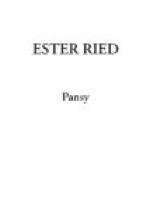traveling companion, a nervous country merchant on
his way to New York to buy goods. He hurried
her through the crowd and the noise into the dining-saloon;
stood by her side while, obedient to his orders, she
poured down her throat a cup of almost boiling coffee;
then, seating her in the ladies’ room charged
her on no account to stir from that point while he
was gone—he had just time to run around
to the post-office, and mail a forgotten letter; then
he vanished, and in the confusion and the crowd Ester
was alone. She did not feel, in the least, flurried
or nervous; on the contrary, she liked it, this first
experience of hers in a city depot; she would not have
had it made known to one of the groups of fashionably-attired
and very-much-at-ease travelers who thronged past
her for the world—but the truth was, Ester
had been having her very first ride in the cars!
Sadie had made various little trips in company with
school friends to adjoining towns, after school books,
or music, or to attend a concert, or for pure fun;
but, though Ester had spent her eighteen years of
life in a town which had long been an “Express
Station,” yet want of time, or of money, or
of inclination to take the bits of journeys which
alone were within her reach, had kept her at home.
Now she glanced at herself, at her faultlessly neat
and ladylike traveling suit. She could get a
full view of it in an opposite mirror, and it was
becoming, from the dainty vail which fluttered over
her hat, to the shining tip of her walking boots;
and she gave a complacent little sigh, as she said
to herself: “I don’t see but I look
as much like a traveler as any of them. I’m
sure I don’t feel in the least confused.
I’m glad I’m not as ridiculously dressed
as that pert-looking girl in brown. I should
call it in very bad taste to wear such a rich silk
as that for traveling. She doesn’t look
as though she had a single idea beyond dress; probably
that is what is occupying her thoughts at this very
moment;” and Ester’s speaking face betrayed
contempt and conscious superiority, as she watched
the fluttering bit of silk and ribbons opposite.
Ester had a very mistaken opinion of herself in this
respect; probably she would have been startled and
indignant had any one told her that her supposed contempt
for the rich and elegant attire displayed all around
her, was really the outgrowth of envy; that, when
she told herself she wouldn’t lavish so
much time and thought, and, above all, money,
on mere outside show, it was mere nonsense—that
she already spent all the time at her disposal, and
all the money she could possibly spare, on the very
things which she was condemning.
The truth was, Ester had a perfectly royal taste in all these matters. Give her but the wherewithal, and she would speedily have glistened in silk, and sparkled with jewels; yet she honestly thought that her bitter denunciation of fashion and folly in this form was outward evidence of a mind elevated far above such trivial subjects, and looked down, accordingly, with cool contempt on those whom she was pleased to denominate “butterflies of fashion.”




